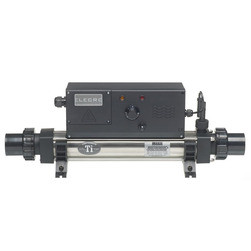Different Types of Swimming Pool Heating - Explained
Looking at purchasing a swimming pool heating system can be a little overwhelming at times, with each type having their own advantages & disadvantages. The four most popular heating systems on the market today are; Solar Panels, Heat Pumps, Electric Element & Gas Heating.
Solar Panels
Solar has become increasingly popular for its obvious advantage in using free energy from the sun, which also makes this option the most eco-friendly & cost effective.

How Does It Work?
Solar heating systems work by direct heat transfer. The water from the pool is circulated passing through the collector, which is normally located on the roof of a building. It is common for systems such as solar to use a digital controller, this sends water to the roof whenever there is enough sunshine, provided that the pool is not already at the set temperature.
Advantages
- Increases the temperature of the pool by up to 5°C.
- Inexpensive installation and maintenance
- Increases swimming time by up to 6 hours
- Able to cool down a pool on hot days, by operating it at night
- Environmentally friendly
- Cost Effective
Disadvantages
- Requires direct sunlight, so is not applicable to all households
- Can be aesthetically displeasing
- System depends on weather conditions
- Can only use the energy that has been collected from the sun – like a battery
Heat Pumps
These are considered the easiest solution to heat a swimming pool. They can be operated on / off with an easy to use varying control, however they do require an external power supply. Even though this type of heating uses an external power supply, it is still remarkably efficient.

How does it work?
Heat pumps are much like an air conditioner, they just work in reverse. Instead of taking air from a space , removing the heat and returning it - A heat pump takes large amounts of air from the atmosphere, the heat contained in the air is removed and transferred to water from the pool passing through the unit.
Advantages
- Maintains pool temperature of between 28°C and 35°C.
- Clean, safe and easy to operate.
- Heat on demand, not reliant on weather conditions.
- Durable – with proper maintenance, it can last up to 15 years.
- Varying temperature options.
Disadvantages
- Initial cost and installation can be expensive
- Reliant on external power source
- Units can be noisy
View our comprehensive range of Heat Pumps - Click Here
Electrical Element
Electric element heaters are purpose built and provide a low purchase cost option, which is compact and easily installed.

How does it work?
Element heating works much like an electric kettle in that there is a direct heat transfer between the immersed element and the pool water. The small physical size of the units makes them ideal for use where plant space is at a premium or where gas supply is not available and the special installation needs of a heat pump cannot be met. Element heaters will operate at a slightly higher cost to gas if connection is made to the overnight off peak tariff.
Advantages
- Energy Efficiency
- Inexpensive to purchase
- Safe to use & easy installation
- Reliable
- Low maintenance costs
- Silent
- 100% of heat goes into the Water
- Environmentally friendly - No air pollution
Disadvantages
- Energy costs
View our comprehensive range of Electrical Element - Click Here
Gas Heating
Gas-powered swimming pool heating is incredibly popular in America, where households can connect up to the gas line like electricity. They use either natural gas or propane to heat the water in a combustion chamber. This is most efficiently used to heat the pool for short periods and can be quicker than alternatives.

Advantages
- Almost instant pool heating.
- Completely independent - not reliant on weather or electricity
- Varying sizes and designs
- Can maintain nearly any temperature desired
- Cost efficient for pools that aren’t used regularly
Disadvantages
- Relatively expensive to fuel
- You generally have to store propane tanks on your property
- Creates some greenhouse gases; not as environmentally friendly as alternatives
- Requires complex installation and complicated maintenance procedures
View our comprehensive range of Gas Heaters - Click Here

